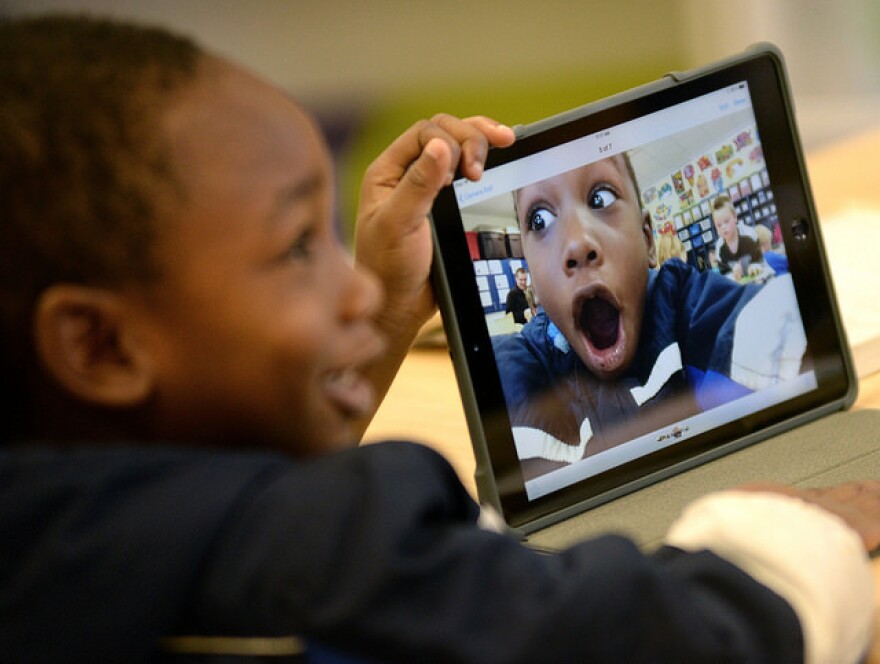Almost every day, it seems like there’s another headline raising concerns about how screen time affects kids’ brain development and emotions. Even a group of former Facebook and Google employees is trying to call attention to the potential harms of technology for children.
NPR lead digital education correspondent Anya Kamenetz advocates that parents inform themselves but not freak out. She’s the author of the new book, The Art Of Screen Time: How Your Family Can Balance Digital Media And Real Life.
Kamenetz will speak on Wednesday evening at an event hosted by Town Hall Seattle and the Phinney Neighborhood Association.
In her book, Kamenetz offers a number of best practices for parents struggling to figure out how to manage their kids’ use of digital media. Among the tips:
1. Use Screens Together
Parents should treat television and other screens much like a picture book, Kamenetz says. That means sitting on the couch with a child while he or she watches a cartoon and talking about the story and the lessons in the show. She says the same applies for apps and video games – parents should play along with their kids whenever possible.
“The reason that we do this is we want to help transfer learning and lessons into the real world,” she said in an interview. “And we also want to help our kids interpret and manage things that maybe seem a little problematic or at least just hard to understand because we only have a few years before our kids are out there exploring on their own and reaching all kinds of content, and we want to have that open line of dialogue about the kinds of media they’re encountering.”
Screens are not the enemy, she says. There are a lot of creative uses of digital media and kids should be encouraged to explore everything from online coding tutorials to making art with design programs.
“When it comes to families and media, the potential is at least as dazzling as the dangers are dark,” she writes.
2. Be Vigilant About Sleep
While scientific research on the consequences of digital media consumption for kids is still emerging, Kamenetz writes there is a lot of evidence that screen time before bed leads to poor-quality sleep. That, in turn, is connected to a range of problems including depression and anxiety and even compromised immunity.
So she recommends that kids not use devices up to an hour before bedtime and not have them in their bedrooms.
3. Be Mindful Of Your Own Phone Use
“Anything that we try to enforce or try to impose is only going to be as strong as our own behavior,” Kamenetz said. “I really invite parents to think about their own habits and realize our kids are watching us all the time and if we want to impose balance, it’s something that we have to take on.”
4. Tailor Your Approach To Your Kid
There are risks to kids using digital devices, and some of the research can be frightening to parents. There is a connection between watching violent content and aggressive behavior, for example. And there are studies that have linked emotional problems such as depression and anxiety with social media use.
Kamenetz writes that some highly sensitive children are more susceptible to the negative impacts of digital media. So parents need to determine how vulnerable their kids are to the harms of screen time, including addiction, and structure their usage based on that.
“The idea is that most children are dandelions,” she writes. “They are hardy, resilient. They can thrive in a wide range of settings. A few children, however, are orchids. They’re highly sensitive to severe consequences if their environment is less than optimal.”
5. Don’t Go Overboard On Surveillance
Kamenetz says as kids enter their teen years, it can be tricky to figure out how much to monitor their online lives.
“If a kid has given you significant reason to worry or doubt that they can keep themselves safe online, maybe you need to be that conscience for them,” she said. “But ultimately, our goal is to have kids that are self-regulators and have good executive function and are trustworthy.”
She says parents might consider having a relative or friend connect with their kids on social networks to be on the lookout for inappropriate use. But Kamenetz says parents should resist the urge to demand their kids’ passwords or install monitoring or tracking software because that shows a lack of trust.
“In the worst cases it kind of displays the idea that love means I always know where you are, and love means you have no secrets from me, and that’s a very unhealthy model or map for teenagers who may be entering into their first romantic relationships,” she said.







